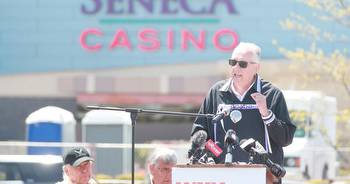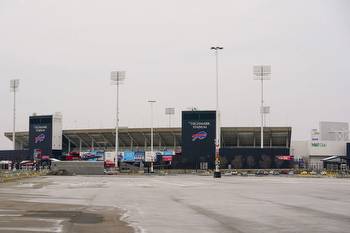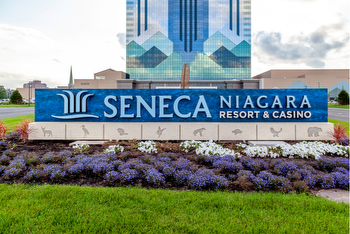Officials react to Senecas paying casino funds

The Seneca Nation announced March 29 that its Council has taken action to resolve the ongoing gaming compact dispute with New York state and begin talks for a new compact.
With the Nation agreeing to transfer $565 million from a restricted escrow account to the state to resolve the outstanding dispute, local officials have yet to know what funding will be coming into their communities.
Salamanca Mayor Sandra Magiera said she’s glad the dispute has been resolved and is looking to move forward — even if the city isn’t expected to see a surge of economic benefit.
“People asked me again yesterday about this money and that we have it, but we don’t,” she said March 30. “I just wish I knew what that share was going to be.”
Payments stopped in 2016
The city of Salamanca, the Salamanca school district and Cattaraugus County have an agreement to divide the revenue-sharing payments from the state. The last time quarterly payments from New York state were received was the second quarter of 2016.
The Senecas announced the following spring that they interpreted the gaming compact as not requiring payments to the state in the last seven years of the pact. That set off a four-year legal battle that led to a string of defeats for the Senecas, including arbitration and federal court decisions.
Cattaraugus County received $318,476 from that second quarter-payment in 2016, the city of Salamanca received $248,570 and the school district got $1.4 million. Of that amount, $701,105 was to cover property tax losses and a little less than $1.03 million toward direct costs.
However, County Administrator Jack Searles said March 30 that he doesn’t know what the county might receive through the state’s 25% share of slot machine revenue from the Senecas’ casino in Salamanca.
“This is premature until we have some communication from the state to even prognosticate what dollar amounts are going to be,” he said. “It’s not a straight line progression because the casinos have different draws associated with that.”
Regardless of payments the communities receive, Magiera said the city planned its 2022-23 budget without expecting to see casino funds. When the payments do arrive, she said city officials plan to keep it in reserve for the next budget year and not make any immediate expenditures.
“We know we don’t have that much more coming in the future, either,” she said. “There’s only one more year of the compact, if they choose to pay that one.”
In the past five years, the state lent the city of Salamanca about $15 million to counter the loss of expected casino payments. However, Magiera said if the state already had an idea of what was coming from the Nation, it shouldn’t have been difficult to figure out what the communities were owed and pay it up front.
“I don’t feel there’s any need for them to hold up their share of the money,” she added.
Seneca accounts freed
The Seneca Council’s action will also allow for restrictions placed on several bank accounts held by the Nation and its businesses to be lifted. The accounts were frozen by New York state on March 25, despite the state’s knowledge that the Nation’s secured account held more than sufficient funds to satisfy any compact-related matters.
Seneca officials said the state’s actions threatened delivery of services, including healthcare and education, to the Seneca people, thus threatening thousands of Seneca and non-Seneca individuals and families across Western New York.
“I think it’s a shame (the state) did freeze their money, because I don’t think they needed to freeze all the accounts,” Magiera said. “I’m just glad it turned out the way it did — peacefully.”
Over the last several days, the Seneca Gaming Corporation Board of Directors met with key members of its senior management team, as well as Seneca Nation councilors and executives, to fully understand the state’s latest actions.
“The Seneca Nation, its members and the entire Western New York region directly benefits from our gaming operations,” said Dr. Lori V. Quigley, chair of the board. “The Seneca Gaming Corporation is a leading economic driver in the region that supports the livelihoods of thousands of individuals and businesses throughout Western New York.”
Quigley said Seneca Gaming is grateful to the Council and executives for their leadership in protecting the interests of their operations, business partners and thousands of dedicated, hard-working team members.
“The board is pleased that the issue has been resolved and we can move forward together,” she added.
Stadium deal
Gov. Kathy Hochul said March 29 she has been committed to resolving the dispute and securing the funds the state and local governments have been owed.
“The courts have consistently ruled in the state’s favor, yet no payments were made,” the governor said in a statement. “Upon taking office, I sought to negotiate in good faith, and we have met every hurdle.”
Hochul said the funds were generated in Western New York, and she is directing the state’s share, which is more than $418 million, to the new Buffalo Bills stadium — a deal that was announced March 28.
Seneca Nation President Matthew Pagels and Nation officials were not pleased with the governor’s proposal, decrying it they called New York’s “hostile and shameless greed.”
“After intentionally and unnecessarily holding the Seneca people and thousands of Western New Yorkers and families hostage for several days by strangling various bank accounts held by the Seneca Nation and our businesses, Gov. Hochul couldn’t contain her excitement to boast about using her Seneca ransom money for a new stadium,” Pagels said.
The Seneca president said the governor’s husband, William Hochul Jr., is an executive with Delaware North, a company that operates video lottery terminals within the Seneca Nation’s gaming exclusivity zone with the state’s blessing. Pagels said the company could make millions of dollars in concession business inside the state-financed stadium, adding it’s “being paid for on the backs” of the Senecas.
“We see, and we hope the world sees, the governor’s announcement for what it is — the latest chapter in New York’s long history of mistreatment and taking advantage of Native people,” he said. “Gov. Hochul happily tried to strangle Western New York in order to squeeze every drop of blood she could get from the Seneca Nation.”





































